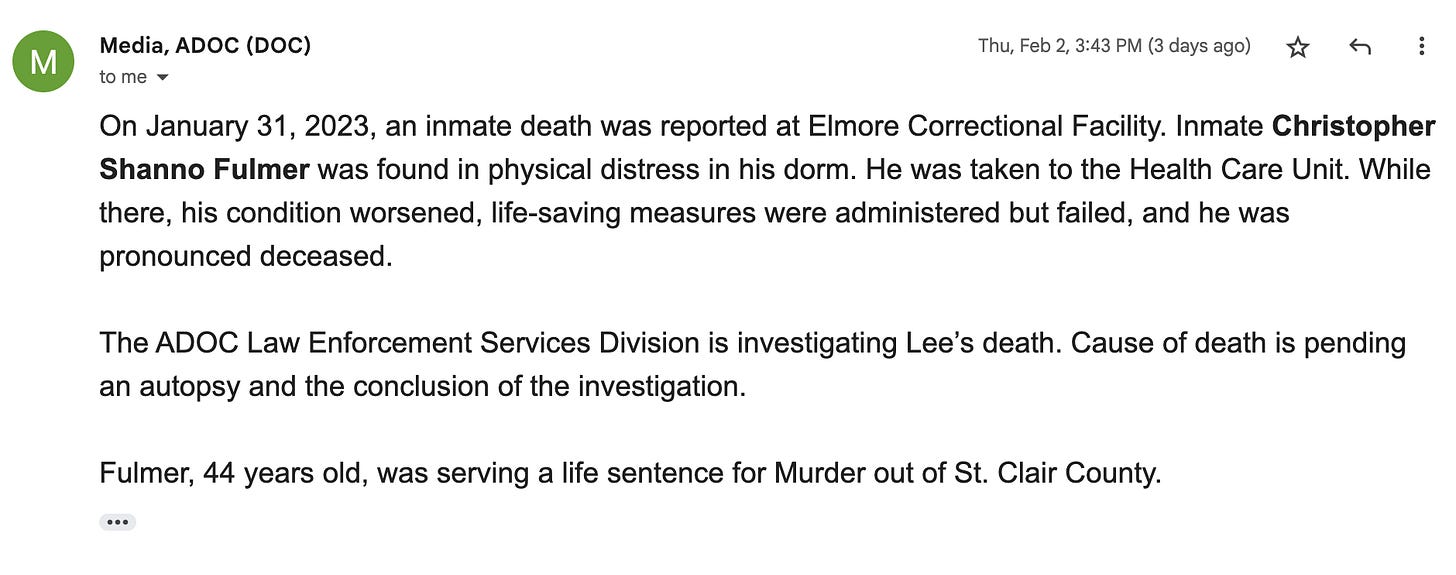Sharon Crocker Harris was right. The last time I spoke with her, she told me her son would die in prison. She didn’t just tell me, she told Alabama's parole board on April 13, 2022. I wrote a story about her plea for mercy and how she stood before the three board members and said her son would not survive prison if they kept him there.
She told them that during his 24 years in custody of the Alabama Department of Corrections (ADOC), her son, Christopher Shannon Fulmer, who she called Shannon, had been beaten and suffered a traumatic brain injury, was constantly surrounded by drugs and her family had been repeatedly extorted. She told them her son had been locked up a quarter of a century for a drug-related crime committed as a teenager, and had been denied parole three previous times. If they cared about the value of his life, Sharon said, it was time for them to let Shannon come home.
The parole board denied Shannon’s parole anyway, ensuring that he wouldn’t be considered again for at least another five years, if he could survive that long. He didn’t even make it another year.
Christopher Shannon Fulmer, 44, died Tuesday January 31 at Elmore Correctional Facility. His family doesn’t know why or how he died, only that prison was a contributing factor. Sharon found out after the prison’s warden called her ex-husband, Shannon’s father, with the news. The only details given were that Shannon had complained of pain in his side, but once he got to the prison infirmary, he passed away. The next day an ADOC investigator mentioned video of Shannon collapsing. Sharon also received information from a person incarcerated in the same dorm who said Shannon had a heart attack.
“I don’t know what to think,” she told me. “I don’t know how long he had to wait to get medical attention, or what was wrong. And then another person in the dorm said Shannon was complaining about hurting for a couple of days. Did he not get the proper care that he needed? I don’t know. But I’m not shocked. I’ve been expecting this.”
ADOC responded to my request about Shannon’s death sending a short email with the following information:
Shannon had last talked to his mother on the phone two days before his death. She said he told her he was OK and did not mention that he was in any pain. She suspected he’d been using drugs inside ADOC—he’d been asking for money and had some near misses with overdoses over the years. None of this makes his death any less agonizing. Not knowing how he died compounds her helplessness. Sharon even went to Elmore Prison to try to get information, but was met with indifference.
“They were the rudest people,” she said. “A captain came out, and another man. They’re all smirky, asking us, ‘What can we do for you?’ And I said ‘My son passed away over here yesterday morning and we want some answers.’ They just told me I wasn’t supposed to be on state property and they weren’t allowed to tell me anything.”
Sharon eventually made contact with the prison’s chaplain, who gave her some forms and information about claiming her son’s remains. He told her she could have her son buried on prison property at no cost to her.
“I told him no,” she said. “They controlled my boy’s life long enough. I’m taking my child with me.”
While Sharon awaits autopsy results, she’s having Shannon’s remains cremated and planning a memorial service in his home of St. Clair County. She’s thinking about the life her son led in prison and all the unnecessary cruelties he endured that were never what she imagined when he went to prison. Even in the last year, ADOC ripped the rug out from under him, suddenly transferring Shannon from Bibb Correctional Facility, where he had friends and a community, to Elmore Prison, where he barely knew a soul. Five months later he was dead.
Sharon told me her son had a hard life, long decades of suffering in prison. At one time the two of them were hopeful that Shannon would be able to make parole, so he followed the rules, took the programs and tried to become a better person, despite his surroundings.
In the end, none of that mattered. Shannon’s sentence made him parole eligible, but the system never saw him that way. His parole eligibility only amounted to words with no real meaning. The Court told him to expect one thing, but the reality created by the state of Alabama gave him something entirely different and grim in return.
Sharon is not alone. At least three other men died inside ADOC in the last week of January. Earlier in the month, at least one man was killed and another died by suicide. A total of 10 deaths were reported for the month. At least 266 people died across the system last year, the highest number of prison deaths on record in Alabama. There are mothers and fathers grieving these deaths all over the state, yet no resources are made available and no leaders even acknowledge the toll.
Instead of working to help grant release to the most deserving people, the parole board has doubled down, ensuring that more people die. In January, the board only granted 9 paroles for the entire month out of 470 eligible people who had hearings. That’s a denial rate of 98 percent. That’s not about public safety, it’s about vengeance, power, politics and cruelty. It reflects an ugly truth about most people in Alabama: we are long and generous with talk about Godliness, but short and stingy with real mercy.
Leaders absolve themselves from responsibility by pointing out what they can’t do, wiping their hands of moral accountability. I’m not a voting member of the board, I’m not responsible for prison overcrowding, I can’t take a position on policy. But, I ask why? How is any of this madness ever going to get fixed if we all stay in our lane? How do all these people in power live with themselves knowing the horrors that occur on their watch?
Their actions and lack of actions tell us they absolutely do not care. AG Steve Marshall has said we don’t have a prison problem. The message of Alabama’s indifference to its prison crisis is the incarcerated people inside aren’t worthy of protection. Victims of crimes committed inside prison aren’t victims to them and crime in prison isn’t really crime.
When I think of people in prison, like Shannon, and why they matter, I turn to the words of the late poet Mary Oliver who reminds us that every human being is a child of God.
I think of each life as a flower,
as common as a field daisy,
and as singular,
and each body a lion of courage,
and something precious to the earth.
I’m thinking of Shannon and the life he could have lived if the system had treated him fairly and justly. As a child, he was a gifted athlete and artist. His mom told me he was still talented, still promising, until prison bled him dry of all hope and humanity.
Then he was just surviving, sometimes barely. “I know what we’ve been through, and I know what he’s been through,” Sharon said. “I feel bad because he didn’t get a good life. But I pray he’s in heaven and is good now.”








Thank you for all you do to bring up awareness of our prisons. It amazes me as to how bad we have gotten with no help, I just can't imagine it but here we are! I will continue to pray and if there is anything I can do to help please contact me.
Albert Pugh
Really powerful, Beth. Please keep up your moving writing on this subject.